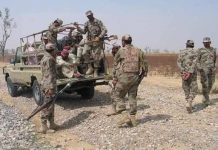Written by:
Lawrence Sellin
Retired Colonel, U.S. Army Reserve
Ironically, Pakistan’s opposition to U.S. and NATO efforts to stabilize Afghanistan through its support of the Taliban and Haqqani insurgents would lead to greater regional instability and, perhaps, create an existential threat to Pakistan itself should Western forces withdraw.
In the absence of U.S. and NATO assistance, the Afghan government would fall within twelve months and Afghanistan would revert to conditions similar to those of the 1990s civil war when the country was divided along ethnic and, to some extent, religious lines.
The predominantly Pashtun Taliban would attempt to reestablish its pre-9/11 government in Afghanistan, but again would be opposed by Tajiks, Uzbeks, Shia Hazaras and, likely, the more secular Baloch, whose population spans both Afghanistan and Pakistan along the southern border.
The Taliban, who do not recognize the Durand Line as the border between Afghanistan and Pakistan would seek to engage Pashtun populations currently under the rule of Islamabad. Iran would significantly increase its support for the Shia Hazaras and other Farsi-speaking groups in Afghanistan.
Unlike the Afghan civil war of the 1990s, a new conflict would have a greater religious component with wider regional impact than the previous ethnic struggle confined to Afghanistan.
It would be a complex mixture of ethnic rivalries, a battle for dominance between fundamentalist Hanafi and Salafi Sunnis within the context of the larger Sunni-Shia struggle and played out on a geopolitical stage involving the national interests of Russia, China, India, Pakistan and Iran.
One unique element of the current situation is the increased influence of the Sunni Ahl-i-Hadith sect in the Punjabi-dominated Pakistani military and its intelligence agency, the ISI. Ahl-i-Hadith is the Pakistani equivalent of Saudi Wahhabism.
That trend runs counter to the Taliban, who are driven by Hanafi Deobandi ideology and Pashtunwali tradition.
Arab, particularly Saudi money, has been pouring into Ahl-i-Hadith organizations in Pakistan, in contrast to their earlier financing of the Deobandis. According to on-the-ground reports, Saudi-sponsored Salafist training camps are being established in Balochistan for attacks on Iran, to which Iran would undoubtedly respond.
It is also a small ideological step from Salafi Ahl-i-Hadith to the Islamic State (IS), which explains the growth of IS affiliates in Pakistan, who are now migrating into Afghanistan.
In essence, what we are witnessing is the development of the situation similar to what recently occurred in Syria and Iraq, but on a much larger and more dangerous scale involving nuclear armed powers competing in a religiously explosive environment.
Of all the countries in the region, Pakistan is probably the most vulnerable. It has long been the policy of the Pakistani government to promote Islam as a societal “glue” to combat ethnic separatism and to use Islamic terrorism as a foreign policy instrument to compensate for its relative weak military position versus India.
Unfortunately for Pakistan, that policy has backfired. Ethnic separatism has only increased, particularly in Balochistan, and the proliferation of ever more extreme Sunni Islamic groups inside Pakistan has made it an international pariah and a growing threat to its neighbors, namely Shia Iran and Hindu India.
Pakistan could achieve a short-term “win” by forcing the U.S. and NATO out of Afghanistan, but it would never obtain its objective of maintaining Afghanistan as a client state to the exclusion of India, while unleashing forces that could lead to regional chaos and overwhelming its own national interests.
By destabilizing Afghanistan, Pakistan ultimately may be destabilizing itself. It is stupidity on steroids.
Lawrence Sellin, Ph.D. is a retired US Army Reserve colonel, an IT command and control subject matter expert, trained in Arabic and Kurdish, and a veteran of Afghanistan, northern Iraq and a humanitarian mission to West Africa. He receives email at lawrence.sellin@gmail.com.






























